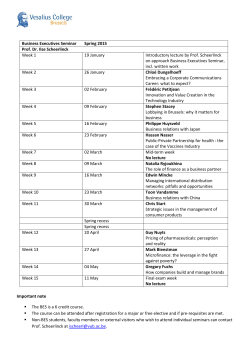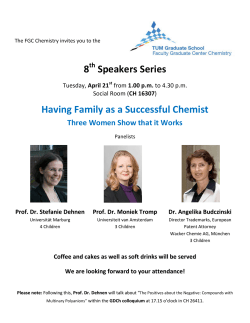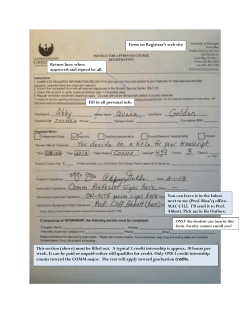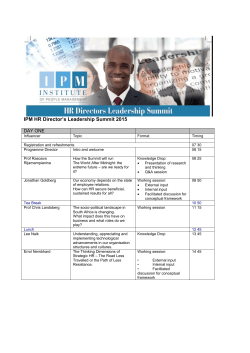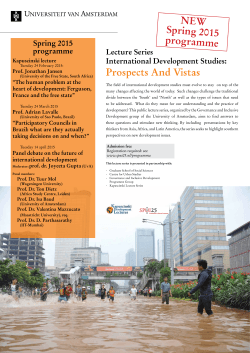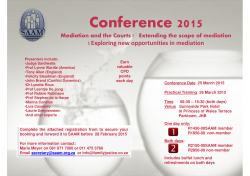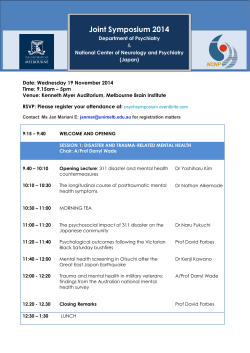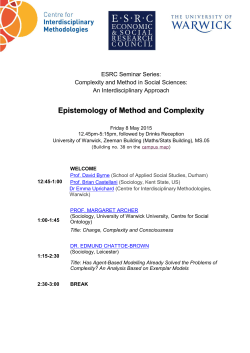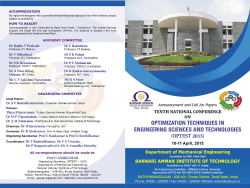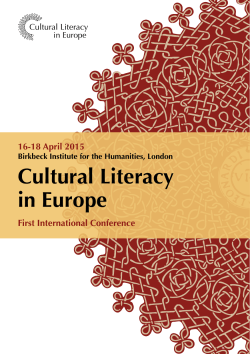
Advances in Research on Neurodegenerative Disease with a Focus
Advances in Research on Neurodegenerative Disease with a Focus on Dementias German National Academy of Sciences Leopoldina The Leopoldina brings together the expertise of some 1,500 distinguished scientists to bear on questions of social and political relevance, publishing unbiased and timely scientific opinions. The Leopoldina represents the German scientific community in international committees and pursues the advancement of science for the benefit of human kind as well as for a better future. A growing number of people are confronted with neurodegenerative diseases such as Alzheimer’s disease and other dementias. Public awareness is rising, particularly in countries with high life expectancy, such as Israel and Germany. The hopes of patients and relatives lie on progress in medical research and the development of novel pharmaceuticals. Israel Academy of Sciences and Humanities Chartered by law in 1961, The Israel Academy of Sciences and Humanities (The Academy) acts as a national focal point for Israeli scholarship in both the natural sciences and the humanities. The Academy, consists of 112 Israel’s most distinguished scientists and scholars, monitor and promotes Israeli intellectual excellence, advise the government on scientific planning, publish monumental research scripts, and maintain active relations with National Academies and the international scientific and scholarly communities. Against this background, renowned scientists from Israel and Germany meet to discuss the latest data on and the most recent developments in neurodegenerative diseases and dementias. The meeting will also address differential diagnosis and biomarkers, molecular biology and genetics as well as therapeutic strategies for dementias. In addition, young scientists from Israel and Germany will present their research in two poster sessions. An event on the occasion of 50 years diplomatic relations Germany-Israel. 1965 - 2015 שנה50 ליחסי הדיפלומטיי גרמניה-ישראל 50 Jahre Diplomatische Beziehungen Deutschland-Israel Advances in Research on Neurodegenerative Disease with a Focus on Dementias Registration For participation at the symposium, please register here until 28 April 2015: www.leopoldina.org/en/4ias 4th Inter-Academy Symposium on Neurosciences of the German National Academy of Sciences Leopoldina and the Israel Academy of Sciences and Humanities Contact Dr. Jan Nissen German National Academy of Sciences Leopoldina Department of International Relations Phone: +49 (0)345 472 39 834 E-Mail: jan.nissen@leopoldina.org | www.leopoldina.org 4 – 5 May 2015 German National Academy of Sciences Leopoldina Jägerberg 1 (formerly: Moritzburgring 10) 06108 Halle (Saale) The Leopoldina and the Israel Academy of Sciences and Humanities kindly thank the Fritz Thyssen Foundation and the German Neuroscience Society for their generous financial support of the symposium. Foto: © Juan Gärtner – Fotolia.com Even though the understanding of Alzheimer’s disease and other dementias has much improved in recent years, the underlying molecular principles are not yet fully understood. The mechanisms of protein misfolding and their accumulation – as cytological causes of the disease and its course – are of particular importance in this context. Moreover, further research is needed, for example in the fields of diagnostic biomarkers or the influence of genetic and environmental factors. Programme 2.30 – 3.00 p.m. Risk factors for depression and dementia in geriatric populations: The VITA and VOGEL studies Prof. Jürgen Deckert, University Hospital Würzburg 3.00 – 3.30 p.m. Monday, 4 May 2015 9.00 – 9.30 a.m. | Registration 9.30 – 10.00 a.m. Welcome Address Prof. Jörg Hacker ML, Leopoldina President Session 1 Moderation: Prof. Peter Riederer ML, University Hospital Würzburg Prof. Beka Solomon, Tel Aviv University 10.00 – 10.30 a.m. Molecular neuropathology of frontotemporal dementias Prof. Manuela Neumann, University of Tübingen 10.30 – 11.00 a.m. Transition mechanisms from physiology to Alzheimer’s Disease pathology Prof. Inna Slutsky, Tel Aviv University Genetics of late onset Alzheimer’s disease beyond ApoE4: What are the clinical implications? Prof. Wolfgang Maier ML, University Hospital Bonn & German Center for Neurodegenerative Diseases (DZNE) 3.30 – 4.00 p.m. | Coffee Break Session 3 Moderation: Prof. Karl M. Einhäupl ML, Charité Berlin Prof. Amos Korczyn, Tel Aviv University 4.00 – 4.30 p.m. What we talk about when we talk about disorientation in patients with dementia: Neuropsychological, behavioral and functional neuroimaging evidence Dr. Shahar Arzy, Hadassah Medical Center, Hebrew University 4.30 – 5.00 p.m. Ubiquitin signalling in health and disease Dr. Meike Brömer, German Center for Neurodegenerative Diseases (DZNE) 11.00 a.m. – 12.00 p.m. | Poster Session 1 and Coffee Break 12.00 – 12.30 p.m. The role of microglia and associated inflammatory processes in neuropsychiatric and neurodegenerative diseases Prof. Raz Yirmiya, Hebrew University 12.30 – 1.00 p.m. Was Alois Alzheimer’s histological description helpful in understanding why so many old people get demented? Dr. Ramit Ravona-Springer, Sheba Medical Center 1.00 – 2.00 p.m. | Lunch Break Session 2 Moderation: Prof. Michael Frotscher ML, University Medical Center Hamburg-Eppendorf Prof. Oded Abramsky, Hadassah Medical Centre 2.00 – 2.30 p.m. Alzheimer´s disease: an evolutionary perspective Prof. Thomas Arendt, Leipzig University Tuesday, 5 May 2015 Session 4 Moderation: Prof. Yadin Dudai, Weizman Institute of Science Prof. Walter Müller, Goethe University Frankfurt am Main 10.00 – 11.00 a.m. | Poster Session 2 and Coffee Break Session 5 Moderation: Prof. Markus Otto, Ulm University & (to be announced) 11.00 – 11.30 a.m. The SPP/SPPL family – fascinating homologues of the gamma-secretase PD Dr. Regina Fluhrer, LMU Munich 11.30 a.m. – 12.00 p.m. MicroRNA-target interactions in neurodegenerative diseases Prof. Hermona Soreq, Hebrew University 12.00 – 12.30 p.m. Unexpected roles of the innate immune complement pathway in the developing brain Prof. Orly Reiner, Weizmann Institute of Science 12.30 – 1.30 p.m. | Lunch Break Session 6 Moderation: Prof. Amiram Grinvald, Weizmann Institute of Science Prof. Dan Rujescu, University Hospital in Halle (Saale) 1.30 – 2.00 p.m. The role of microglia in pathology Prof. Helmut Kettenmann ML, Max-Delbrück-Center for Molecular Medicine 2.00 – 2.30 p.m. Apolipoprotein E4 – targeted therapy of Alzheimer’s Disease Prof. Daniel Michaelson, Tel-Aviv University 2.30 – 3.00 p.m. 8.30 – 9.00 a.m. Why multi target drugs for Alzheimer’s Disease? Prof. Moussa Youdim ML, Technion Advances in Alzheimer’s disease research – evolving concepts in biomarker, diagnostics and therapy development Prof. Harald Hampel, Université Pierre et Marie Curie 3.00 p.m. | End of Conference 9.00 – 9.30 a.m. Membrane homeostasis of the prion protein as a key regulator in neurodegenerative diseases Prof. Markus Glatzel, University Medical Center HamburgEppendorf (UKE) 9.30 – 10.00 a.m. Interplay between Amyloid-beta and Tau in degenerating neurons Dr. Eva-Maria Mandelkow, German Center for Neurodegenerative Diseases (DZNE) ML – Member of the Leopoldina
© Copyright 2025
